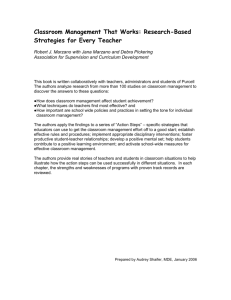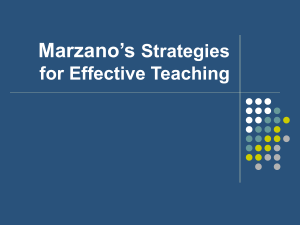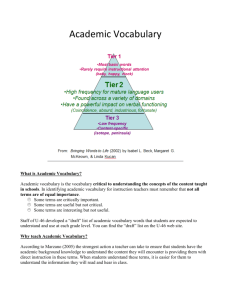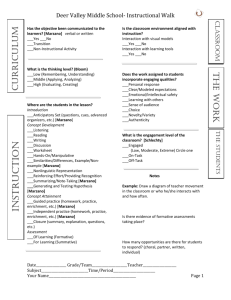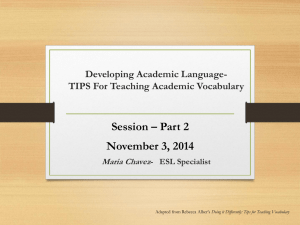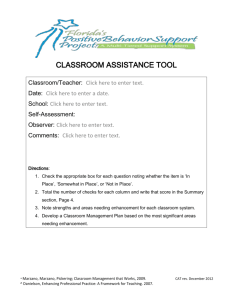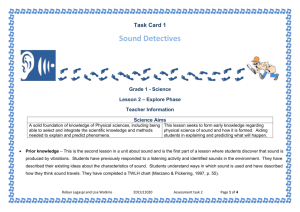Good Homework Policy - National Association of Elementary School
advertisement
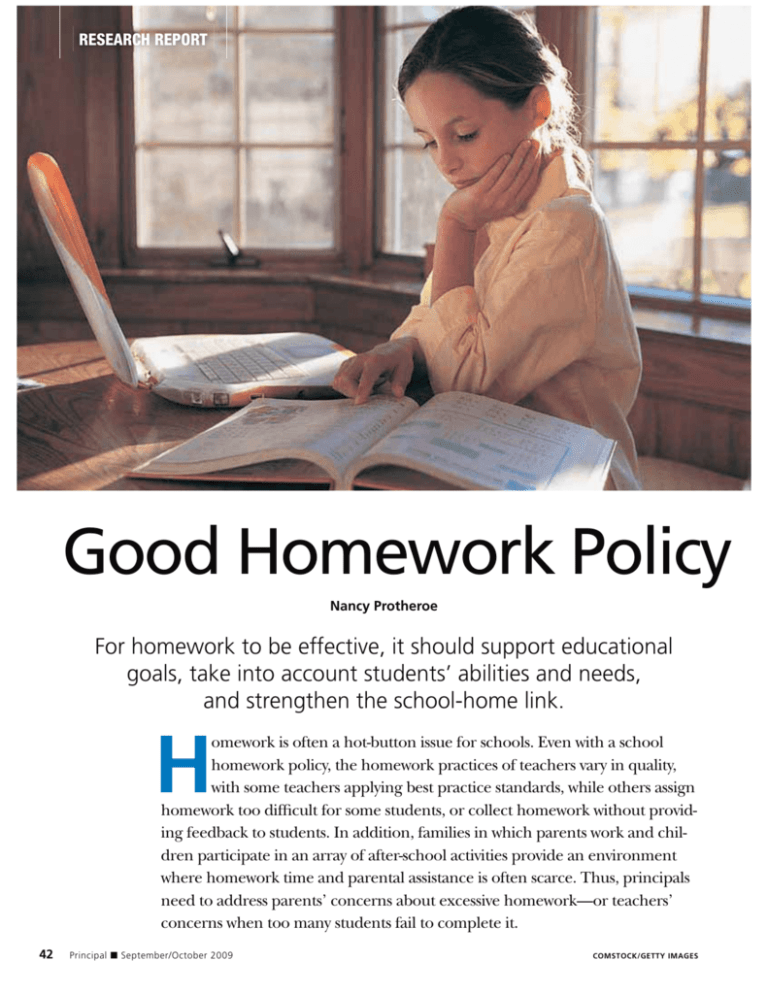
RESEARCH REPORT Good Homework Policy Nancy Protheroe For homework to be effective, it should support educational goals, take into account students’ abilities and needs, and strengthen the school-home link. H omework is often a hot-button issue for schools. Even with a school homework policy, the homework practices of teachers vary in quality, with some teachers applying best practice standards, while others assign homework too difficult for some students, or collect homework without providing feedback to students. In addition, families in which parents work and children participate in an array of after-school activities provide an environment where homework time and parental assistance is often scarce. Thus, principals need to address parents’ concerns about excessive homework—or teachers’ concerns when too many students fail to complete it. 42 Principal N September/October 2009 COMSTOCK/GETTY IMAGES Principals and teachers can use research about homework to address two important questions: Does homework support higher levels of student learning? What are characteristics of effective homework practices? What Does the Research Say? As with many of the school-related variables that could impact student learning, it is difficult to isolate a connection between homework and student learning because there are so many additional factors—quality of the homework, student motivation, and family support, just to cite a few—that are part of the equation. While some studies attempt to control for such factors, much of the research “simply correlates homework and achievement with no attempt to account for student differences” (Cooper, 2006). Looking at the body of research as a whole, “The link between homework and achievement is far from clear. There is no conclusive evidence that homework student achievement. Cooper, Robinson, and Patall (2006) found “generally consistent evidence for a positive influence of homework on achievement.” Marzano and Pickering (2007b) agree. Their review of the homework research found that “with only rare exceptions, the relationship between the amount of homework students do and their achievement outcomes was found to be positive and statistically significant.” Syntheses of homework research have also identified a theme particularly important to educators in elementary schools. Typically, the correlation between homework and achievement appears to be stronger in grades 7-12 than in K-6 (Cooper, Robinson, & Patall, 2006; Marzano & Pickering, 2007b). Such research, however, generally relates to a direct link between homework and achievement. Cooper (2001) suggests that educators should look more broadly at possible benefits of homework that can ultimately impact student learning, and highlights three of these: = Good increases student achievement across the board” (Center for Public Education, 2007). Harris Cooper, a researcher with a long-time interest in the issue of homework, agrees. However, he also points to the few carefully controlled studies that have found positive links between homework and student scores on end-of-class tests. For example, one study found that second-grade students assigned math homework did better on such tests than comparable students who were not assigned homework. Because there are so few of these carefully controlled studies, some researchers use an approach called meta-analysis to attempt to identify themes from the larger body of homework research, using even those studies that simply correlate homework and www.naesp.org Marzano and Pickering (2007a) provide a good starting point to the discussion about effective homework practices: “Homework should not be assigned simply as a matter of routine,” but instead only when there is a clear purpose in regard to student learning. In essence, good homework practices are consistent with good teaching. Marzano, Gaddy, and Dean (2000) emphasize that teachers should make sure the purpose of homework assignments is clear. Students should leave the classroom with no confusion about either what they are being asked to do or how to do it. The research is especially clear about one point in relation to homework: It should not be used to teach new material (Cooper, 2001). Although homework assignments can be an appropriate means of introducing concepts that will be taught in future lessons (such as gathering current newspaper articles on a specific science topic, or interviewing grandparents for their Teaching Long-term academic benefits such as better study habits and skills; N Nonacademic benefits, including greater self-direction, greater selfdiscipline, better time organization, and more independent problemsolving; and N Greater parental appreciation of and involvement in schooling. N Homework Practices If the homework research addressed only the homework-achievement link, elementary school educators might reasonably feel that little guidance has been provided for them. However, researchers have also addressed a critically important question: Which practices help to increase the benefits of homework while minimizing potential problems? first-hand accounts of historical events), tasks assigned for preparation purposes should be discussed and expanded upon, with explicit connections made to material presented in class. Teachers also should make sure their students fully understand the concepts and possess the skills needed to complete any homework assignment. For example, requiring students to practice math problems at home that they do not fully understand in class will only discourage and frustrate them. Further, practicing a skill that is either not well understood or—worse—misunderstood “might also serve to habituate errors or misconceptions” (Marzano, Pickering, & Pollock, 2001). Marzano and Pickering (2007a) highlight a related characteristic of effective homework: It “should be structured in a Principal N September/October 2009 43 way the students can accomplish it with relatively high success rates.” Paulu (1998) suggests that the use of a consistent homework schedule “helps students remember to do assignments. A consistent schedule can also help busy parents remember when their children’s assignments are due.” Vaughn and her research colleagues (in ERIC, 2001) synthesized the research on students’ perceptions related to homework. Their findings provide additional good practice suggestions. For example, students found it helpful when teachers used these strategies: Assigned homework toward the beginning of class; N Explained how to do the homework, including providing examples and writing directions on the chalkboard; N Gave students time to start the homework in class, then checked for understanding and provided assistance before the end of the class period; N Explicitly related the homework to class work; and N Permitted students to work together on homework in class. N Finally, teachers should never give homework as punishment. Cooper (in Silvis, 2002) warns: “It implies you think schoolwork is aversive. Kids will pick up this message.” Walberg and Paik (2004) identify teacher feedback to homework as having a powerful positive effect on student learning. Specifically, “students learn more when they complete homework that is graded, commented upon, and discussed by their teachers.” These researchers also suggest that it is especially important to reinforce what has been done correctly and to re-teach concepts and skills that homework demonstrates students still have not mastered. Marzano, Gaddy, and Dean (2000) suggest that not all this feedback needs to be in the form of teacher notes on the top of every assignment paper. For example, student discussion of homework can pro- 44 Principal N September/October 2009 vide helpful feedback, as long as the teacher also monitors the work of individual students to ensure that a student who has struggled with the homework is not overlooked. Taking a Schoolwide Approach A school policy regarding homework, along with clear expectations for teachers as to what constitutes good homework, can help to strengthen the benefits of homework for student learning while decreasing potential problems. The policy might define the role of homework in learning at each grade level. For example, “[H]omework should help young children develop good study habits, promote positive attitudes toward school, and communicate to students that learning takes place outside as well as inside school. Thus, assignments should be brief, involve materials commonly found in the home, and not be too demanding” (Cooper, 1994). The Center for Innovation and Improvement (2009) sees homework as “a primary point of interface between the school and the home [with parents better able] to support the school’s purposes for homework when they understand what is expected of their students and their role in monitoring their children’s homework.” Marzano, Gaddy, and Dean (2000) suggest that a school’s homework policy address questions parents often have about homework. For example, the homework policy could specify some responsibilities of teachers, parents, and students (Cooper, 1994). The homework policy of one Massachusetts elementary school— developed through collaboration of teachers, parents, and other school staff—delineated specific responsibilities for teachers: Acknowledge an assignment’s importance with corrections and feedback; and N Periodically solicit feedback on assignment difficulty and completion time from parents and students (Shellard & Turner, 2004). N Another role for schools—although teachers should also be sensitive to it—involves recognizing the limitations that students’ home environments might place on their ability to do homework well or even at all. Vatterott (2003) cautions that “used improperly, homework disproportionately causes students who are academically or situationally challenged to fail” and so may increase achievement gaps. For some students, an after-school program that provides homework assistance might be a necessity. This brief overview of the current W EB RESOU RC ES A Report to Parents titled “Effective and Appropriate Help With Homework” is available on the NAESP Web site. www.naesp.org/report_to_parents. aspx The U.S. Department of Education’s Web site provides a brief PowerPoint presentation in English and Spanish about homework that schools could use with parents. www.ed.gov/teachers/how/parents/ homework-tips/edlite-index.html MetLife periodically surveys teachers, selecting a specific issue as the focus of each study. A recent study asked teachers, parents, and students about homework practices and about their opinions concerning homework. www.metlife.com/teachersurvey Communicate clear expectations for each assignment; N Assign developmentally appropriate homework—not busy work; N Limit the amount of homework given to allow for independent reading time; N www.naesp.org research and practices related to homework highlights the complexity of the issue. For homework to be effective, it should be carefully planned to support specific educational goals, take into account the specific abilities and needs of students, and strengthen the link between home and school. P Nancy Protheroe is director of special research projects at Educational Research Service. Her e-mail address is nprotheroe@ers.org. References Center for Public Education. (2007). Research review: What research says about the value of homework. Retrieved May 1, 2009, from www.centerforpubliceducation. org/site/c.kjJXJ5MPIwE/b.2480699/k. D9C5/Homework.htm Center on Innovation and Improvement. (2009). Training for instructional leaders: Session four–instructional delivery. Lincoln, IL: Author. Cooper, H. (1994, Summer). Homework research and policy: A review of the ur o Y om e k sro nto a T las ro C To To literature. Research/Practices Newsletter. Retrieved June 4, 2009, from http:// cehd.umn.edu/CAREI/Reports/ Rpractice/Summer94/homework.html Cooper, H. (2006). Does homework improve academic achievement? Retrieved May 1, 2009, from http:// news.duke.edu/2006/09/homework_ oped.html Cooper, H. M. (2001). Battle over homework: Common ground for administrators, teachers, and parents (2nd ed.). Thousand Oaks, CA: Corwin Press. Cooper, H., Robinson, J. C., & Patall, E. A. (2006). Does homework improve academic achievement? A synthesis of research, 1987-2003. Review of Educational Research, 76(1), 1-62. ERIC Clearinghouse on Disabilities and Gifted Education. (2001, Spring). Views from the field. Research Connections in Special Education, 6-7. Marzano, R. J., Gaddy, B. B., & Dean, C. (2000). What works in classroom instruction? Aurora, CO: McREL. Marzano, R. J., & Pickering, D. J. (2007a). Errors and allegations about research on homework. Phi Delta Kappan, 88(7), 507-513. Marzano, R. J., & Pickering, D. J. (2007b). Special topic: The case for and against homework. Educational Leadership, 64(6), 74-79. Marzano, R. J., Pickering, D. J., & Pollock, J. E. (2001). Classroom instruction that works: Research-based strategies for increasing student achievement. Alexandria, VA: Association for Supervision and Curriculum Development. Paulu, N. (1998). Helping your students with homework: A guide for teachers. Office of Educational Research and Improvement, U.S. Department of Education. Retrieved May 1, 2009, from www.ed.gov/PDFDocs/ hyc.pdf Shellard, E. G., & Turner, J. R. (2004). ERS focus on...Homework: Research and best practice. Arlington, VA: Educational Research Service. Silvis, H. (2002, Summer). Take-home lessons. Northwest Education Magazine. Retrieved May 1, 2009, from www.nwrel.org/ nwedu/2002sum/take-home.html Vatterott, C. (2003). There’s something wrong about homework. Principal 82(3), 64. Walberg, H., & Paik, S. (2004). Effective general practices. In G. Cawelti (Ed.), Handbook of Research on Improving Student Achievement (3rd ed.), 25-38. Arlington, VA: Educational Research Service. Downtown Toronto Sample Layout - other layouts available NEILL-WYCIK Specially Designed for Groups 8 ,(/3$&0-3.!""-++-#!2(-,1.$0%$"2%-0"'!.$0-,(,& Separate Bedrooms Shared common areas 8(,32$1!5!7%0-+!*+-12$4$072'(,& Your own private doors 8.$,$!0*7!72-*!2$3&312 8$120!2$1(,2-5, NEILL-WYCIK $00!0#20$$2!12-0-,2-!,!#! '-,$ 8!6 1-800-268-4358 +!(*0$1$04!2(-,1,$(**57"()"-+ 555,$(**57"()"-+ www.naesp.org Principal N September/October 2009 45
